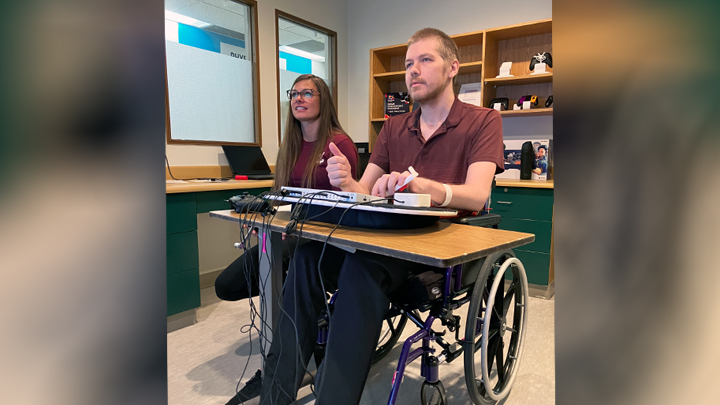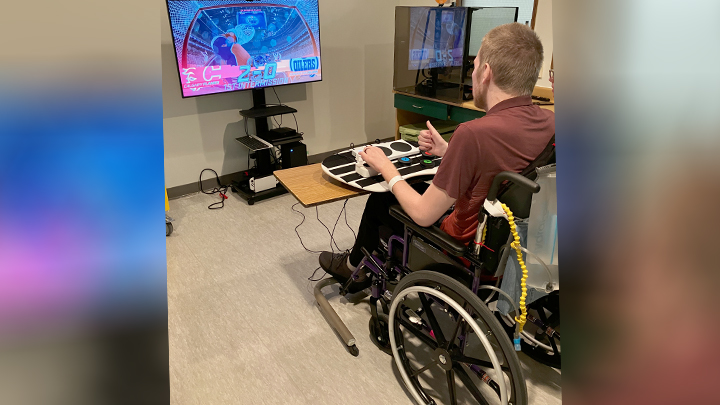
June 13, 2024

Neuro rehab patient Karl Sawatzkoi readies himself for another period of hockey action with his therapist. Photo by Blain Fairbairn.

A new adaptive gaming program at Foothills Medical Centre provides patients like Karl Sawatzkoi with a fun and therapeutic outlet for healing. Photo by Blain Fairbairn.
Story & photos by Blain Fairbairn
CALGARY — This past January, Karl Sawatzkoi awoke to an unusual weakness and tingling throughout his body. Within days he found himself unable to move or breath on his own in the Intensive Care Unit at Foothills Medical Centre (FMC).
“It all happened so fast,” says the 31-year-old. “I went from being able to do everything I wanted to do, to being flat on my back in a hospital bed. I was basically a full quadriplegic with a breathing tube and everything.”
Sawatzkoi was diagnosed with Guillain-Barré syndrome, a rare autoimmune disorder affecting the nerves that results in weakness and tingling throughout the arms and legs. The cause is unknown, but it’s believed to be triggered by a viral or bacterial infection.
As his body began to heal and to regain strength, Sawatzkoi started a daily regime of rehab with recreational therapists at FMC. In April, he was introduced to the hospital’s new adaptive gaming initiative — and has been enjoying it three times a week ever since.
“I’ve noticed lots of gains. A lot of function has returned to my hands, and I’ve gone from being able to barely sit on my own to now walking using a walker,” he says. “The hand-eye coordination and being able to use my hands more effectively is a huge gain.”
Thanks to funding from Calgary Health Foundation, FMC is now one of two Gaming Accessibility Made for Everyone (G.A.M.E) Checkpoints in Alberta. G.A.M.E is an initiative of Neil Squire's Makers Making Change program, which outfits partner organizations with adaptive gaming gear, resources and training.
Tyler Fentie, accessible gaming lead with Makers Making Change, says that G.A.M.E Checkpoints offers a tailored solution to the usual one-size-fits-all approach that’s standard in gaming — the world’s largest entertainment industry.
“Anyone can pick up a video game controller and start playing, but that’s not an option for many people with disabilities,” says Fentie. “We provide adaptive technology and specialized software so that access to games isn’t a barrier — and that leads to significant therapeutic and social benefits for patients like Karl, and anyone living with a disability.
Michelle Haley, tertiary neurorehab recreational therapy clinical leader at FMC, agrees.
“Gaming can improve neuroplasticity and enhance motor function,” she says. “Being a leisure pursuit it also increases motivation in the rehab process. It adds that little bit of fun so it really helps with participation and engagement when patients are in hospital and having to work at rehab day after day.”
The rehab unit also employs a 3D printer to fabricate controller modifications that are completely customized to each patient’s unique needs, further enhancing the adaptive technology Makers Making Changes provides.
Adaptive technologies are not all about fun and games, however. Patients like Sawatzkoi also receive therapy to help them navigate conventional computers more quickly and successfully, so they can use desktops or laptops for work or play upon discharge. It’s all about removing obstacles so people with disabilities can integrate back into important aspects of their lives with as much ease and efficiency as possible.
For Sawatzkoi, he’s taking it all in stride — and keeping a remarkably optimistic attitude — an outlook influenced by adaptive gaming.
“I had no idea this kind of stuff even existed. It was pretty amazing seeing all the technology they have here and knowing that no matter what your disability is, there’s some way to adapt it so you can do the things you like to do.
“The whole thing has been a strangely positive experience.”